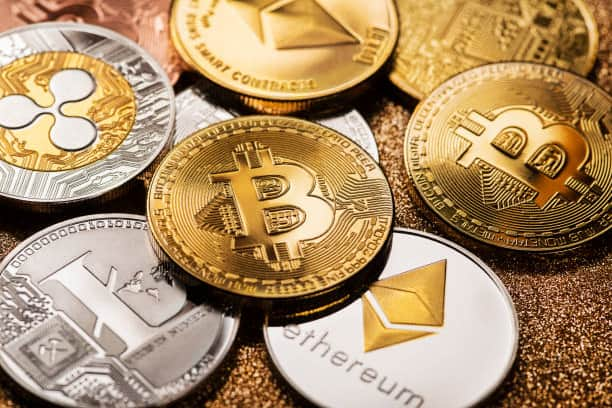Hello, I'm Mike, and today I'm going to take you on a journey into the world of digital currency trading and learn about some of the most common terminology. Whether you're new to cryptocurrency or already have some experience in the market, familiarizing yourself with these terms will definitely make you more comfortable in the trading process. In today's post, I will explain the common terms used in digital currency trading so that you can get started faster and make less detours when investing or trading. Let's start with the basics and go deeper, mastering the key concepts and paving the way for your trading journey.

Basic Terms of Digital Currency Trading
Before you start trading digital currencies, it is important to understand some basic terms. These terms will come up frequently in your future trading sessions, and mastering them will allow you to understand how the market works and make more accurate judgments. The most common terms are "buy orders" and "sell orders", which are the basis of every trade. A buy order is the price you are willing to pay to buy a cryptocurrency, while a sell order is the price you are willing to accept to sell a cryptocurrency. There are also "Limit Orders" and "Market Orders", which represent the two order types of setting a price for a trade or executing a trade at the current market price, respectively.
What is "Blockchain"?
Blockchain is the technology underlying all digital currencies, and can be simply understood as a decentralized ledger system. Whenever a transaction is made, it is packaged into a "block" and linked to the previous block to form a continuous data chain. In this way, all transaction records are stored forever in the entire blockchain network, and no one can easily modify or tamper with this information. For digital currencies, this is not only the technology to ensure transaction security, but also the core of decentralization.
The difference between a "bull" and a "bear" market
The terms "bull market" and "bear market" are used to describe market trends. When the market is in a "bull market", prices are generally rising, investor sentiment is high, and the willingness to buy is strong. Conversely, when the market enters a "bear market", prices are generally falling, investor confidence is low and pressure to sell increases. These two terms are commonly used to describe the overall trend of the market, and understanding them will help you determine whether to enter or exit a market.
Basic operation of the "Coin" and "Euronext" exchanges
Choosing the right exchange is crucial when trading digital currencies. Take "Coin" and "Euronext" for example, both exchanges provide convenient trading platforms that support the trading of multiple cryptocurrencies. Take Coin, for example, you can easily trade spot and futures on its platform, and its user-friendly interface makes it suitable for newcomers. Euronext, on the other hand, has its own rebate program, which is undoubtedly an attractive advantage for frequent traders.
What is a Decentralized Exchange (DEX)?
Decentralized exchanges (DEX) are very different from traditional centralized exchanges (CEX). instead of relying on a central server, DEX trades on the blockchain through smart contracts, allowing each transaction to be completed directly on the blockchain without the need to go through any intermediary in the trading process. This not only improves security, but also protects user privacy. Although DEX's transaction speed and liquidity may not be as good as CEX's, its decentralized nature has made it more appealing to many cryptocurrency enthusiasts.
"The concept and impact of "liquidity
In digital currency trading, liquidity is an important indicator of the health of the market. Liquidity refers to the degree to which an asset in the market can be bought and sold quickly and without large price swings. A highly liquid market means you can trade more quickly and at a reasonable price, reducing the risk of slippage. Conversely, a market with low liquidity may make it difficult for you to place a trade, or if you do, the price may move more. Therefore, choosing an exchange and trade with high liquidity is important for every investor.
What is "Leveraged Trading"?
Leveraged trading is a type of trading that can magnify the risks and rewards of trading. In leveraged trading, investors can borrow funds provided by the exchange to trade on a larger scale. For example, if you have $1,000 in capital and use 2x leverage, you can trade with $2,000 in capital. This magnifies the potential gains, but it also increases the risk. Losses can also be magnified if the market does not move as expected, so leverage should be used with caution.
What are "wallets" and "private keys"?
Secure storage of digital currency is a must for every investor. Digital wallets are tools used to store cryptocurrencies, which are categorized into two types: hot wallets and cold wallets. Hot wallets are connected to the Internet for convenient transactions but are relatively low in security, while cold wallets are not connected to the Internet and are higher in security. The private key is the secret key of each wallet, and owning a private key means having full control over the digital assets in your wallet. Therefore, it is very important to protect your private key, loss or leakage of private key may lead to loss of assets.
Frequently Asked Questions Q&A
Q1: If I'm just starting out with digital currency, which exchange should I choose to trade on?
A1: If you're new to trading, we recommend choosing an exchange with a simple interface, support for fiat currency trading and good support, such as Binance or OKX. These platforms provide abundant teaching materials and customer support, which can help you get started quickly.
Q2: What is the difference between a decentralized exchange (DEX) and a centralized exchange (CEX)?
A2: Decentralized exchanges do not rely on a central server and the trading process is entirely based on the blockchain, whereas centralized exchanges are controlled by a single organization and are faster, but may have certain regulatory or security risks.
Q3: How can I effectively manage my digital currency assets?
A3: Use a cold wallet to store long held assets and a hot wallet for daily transactions. Keep your private keys secure and back up your wallet data on a regular basis.
These terms and basic concepts are a necessary foundation for your entry into the world of digital currencies and will hopefully help you understand more clearly how cryptocurrency trading works.














